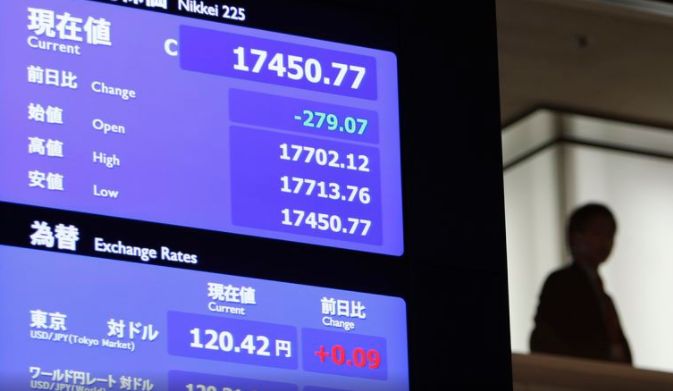
Volatility in global financial markets has increased recently, with the notable fall in the Japanese stock market in particular. As the world's third largest economy, what happens to the Japanese stock market not only matters to its domestic economy, but also has a profound impact on international markets.
First, let's look at the reasons for the sharp decline in the Japanese stock market.
Worries about a global economic slowdown. Uncertainty about global economic growth is one of the main reasons for the current pressure on the Japanese stock market. The weakening momentum of economic growth in many countries and the rise of trade protectionism, especially the continued economic and trade frictions between China and the United States, have brought great challenges to the global supply chain and dented market confidence. As an important part of the global economic system, Japan is naturally difficult to insulate itself, its export-oriented economy is particularly sensitive to the external environment, and the reduction in global demand directly leads to the downward revision of its corporate earnings expectations, which is reflected in the stock market.
The marginal effect of monetary policy is diminishing. The Bank of Japan has long maintained ultra-loose monetary policy, flooding the market with liquidity through purchases of government bonds and other means to stimulate economic growth and push up inflation. However, with the extension of the policy implementation time, its marginal effect gradually weakened, the market's expectations for further easing decreased, and even worried that limited policy space may lead to insufficient liquidity in the market, causing funds to withdraw from the stock market.
Corporate internal governance and profit challenges. Japanese companies have long faced the pressure of structural transformation, including labor shortages caused by an aging society, lack of innovation capacity, and declining international competitiveness. Coupled with the changes in the global economic environment, many enterprises are facing the dilemma of rising costs and declining profits, especially in the rapid iteration of science and technology today, the competitive advantage of traditional industries is gradually weakened, which also intensifies the market's concern about its future development prospects.
Geopolitical risks have intensified. Geopolitical tensions, such as the situation on the Korean Peninsula and the dynamics of China-Japan-South Korea relations, are all risk factors that cannot be ignored for the Japanese stock market. These factors not only affect market sentiment, but also may directly impact the Japanese economy through trade, investment and other channels, which in turn affect the stock market.
So what will be the impact of the fall in Japanese stocks?
The domestic economy is under pressure. As a barometer of the economy, a sharp drop in the stock market will undoubtedly have a negative impact on Japan's domestic economy. The shrinking market value of enterprises, the increasing difficulty of financing, and the reduction of investment will further restrain the momentum of economic growth. At the same time, the stock market decline may also affect consumer confidence through the wealth effect, reducing consumer spending, forming a vicious circle.
The stability of financial markets has been tested. Large fluctuations in the stock market may trigger a chain reaction in the financial market, including bond, foreign exchange, commodity markets and so on. This cross-market contagion effect will increase the fragility of the financial system and test the stability and regulatory capacity of Japan's financial markets. In addition, financial institutions may face the risk of asset depreciation and an increase in bad debts, which in turn affects their lending capacity and the healthy functioning of credit markets.
Pressure for policy adjustment is increasing. Faced with the continued decline in the stock market, the Japanese government and the central bank may face greater pressure to adjust policy. On the one hand, the government needs to introduce more economic stimulus measures to boost market confidence and economic growth; On the other hand, the central bank needs to balance the tightness of monetary policy to prevent a liquidity crisis and avoid the negative effects caused by excessive easing. The complexity and uncertainty of policy making have increased, testing the wisdom and decisiveness of decision makers.
Changes in the pattern of international capital flows. A fall in Japanese stocks could also trigger a shift in the pattern of international capital flows. On the one hand, there could be a flight from Japan to safer destinations such as US Treasuries. On the other hand, some investors may take the opportunity to hunt for investment opportunities at low valuations. This change in capital flows will have an impact on the global asset allocation pattern and may also indirectly promote further integration and competition in international capital markets.
To sum up, the sharp decline in the Japanese stock market is the result of multiple factors, which have far-reaching and complex effects. In the face of this challenge, the Japanese government, enterprises and market participants need to work together to strengthen risk prevention and control, promote economic structural transformation and financial market reform, in order to cope with external shocks and achieve sound and sustainable economic development.

報告顯示,中國電力投資加速增長,預計2024年電網基建投資將超過5300億元。
近日,市場迎來了一則引人注目的消息:工業巨頭3M公司(MMM.N)在本周五公布了其季度業績報告,隨後股價飆升至近兩年來的
最近,外媒給OpenAI算了筆賬,今年可能要血虧50億美元。
近日,巴黎奧運會和世界鐵人三項協會聯合發布了一項重大決定,宣布因塞納河水質污染問題,原定於近期進行的奧運會鐵人三項首次下
當地時間7月18日,法國巴黎發生了一起令人震驚的持刀襲警事件。
近期,一則重大消息在國際舞臺上引起軒然大波,馬來西亞宣布加入金磚國家。
調查發現,互聯網和智能手機的使用幹擾了韓國近五分之一學生的生活。